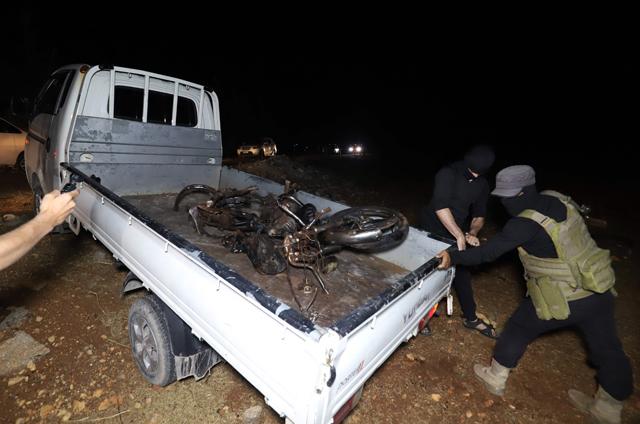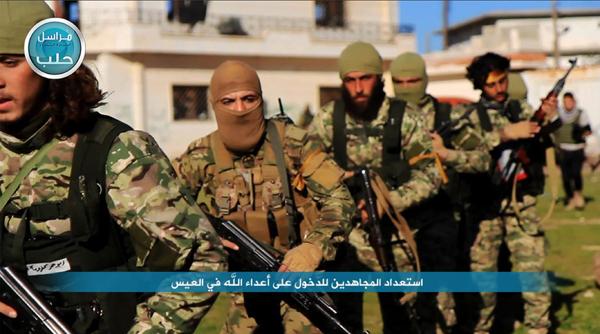You are here
Al Qaeda’s shadow still hangs over Syria’s Idlib — analysts
By AFP - Jan 15,2019 - Last updated at Jan 15,2019

People look at the damage in the aftermath of an explosion in a rebel-held area of the northwestern Syrian city of Idlib, on January 8, 2018 (AFP photo)
PARIS — The terrorist group now controlling Idlib province in northwest Syria claims to have broken with Al Qaeda, but analysts say that despite several rebrandings there's no sign it has changed its stripes.
Hayat Tahrir Al Sham (HTS) sealed its hold on Idlib last week after signing a ceasefire with what was left of rival factions in the region.
Over time, HTS has changed both names and leaders, and statements posted on the internet suggest it had severed ties with Al Qaeda, the Sunni Islamist terror group founded by Osama Bin Laden.
But many experts dismiss such claims as smoke and mirrors, saying the organisation is simply attempting to muddy the waters and confuse intelligence agencies.
Jabhat Al Nusra, the rebel faction which gave birth to HTS, announced in July 2016 it had broken with Al Qaeda.
But this was just ‘‘rebranding while maintaining a secret pledge of allegiance’’, said Hassan Hassan, who specialises in jihadist movements at the Washington-based Tahrir Institute for Middle East Policy.
‘‘Throughout its numerous iterations, HTS has not altered its ideology and is still widely thought to maintain links with Al Qaeda,’’ the US-based Soufan think tank said on Monday.
‘‘HTS maintained links with Al Qaeda's loyalists in northern Syria and even allocated areas and resources for its supposed rivals,’’ Hassan said for his part.
A number of militant groups in Idlib still officially pay allegiance to Al Qaeda, led by Ayman Al Zawahiri, an Egyptian, since Bin Laden's death.
These include Hurras Al Deen, a faction comprising a few thousand terrorists including Syrians and foreign veterans of the wars in Afghanistan and Iraq.
The group also includes members of the Turkestan Islamic Party, a terrorist group dominated by Uighur fighters, according to the Syrian Observatory for Human Rights, a British-based monitor.
Hurras Al Deen fought alongside HTS when it took control of Idlib from other rebel groups backed by Turkey.
‘Staged’ separation
HTS claims more than 25,000 fighters, according to the observatory.
For Jean-Pierre Filiu, a professor at the Sciences Po university in Paris,‘‘Al Qaeda remains a centralised organisation, with a strong top-to-bottom line of command.’’
‘‘There are a number of indications suggesting that HTS has only staged its ‘break’ from Al Qaeda,’’ Filiu said.
‘‘That's one of the main reasons Turkey failed in Idlib, as it had hoped the so-called ‘Syrian’ faction of HTS would help neutralise the terrorist elements,’’ he added.
Jabhat Al Nusra might have sought to distance itself from Al Qaeda since an association would put its fighters in the cross-hairs for US air strikes.
‘‘While HTS proclaims that it is an independent entity not affiliated with Al Qaeda, the organisation grew out of Al Qaeda's Syrian affiliate, Jabhat Al Nusra, following a series of strategic rebrandings,’’ the Soufan think tank also said.
‘‘Throughout its numerous iterations, HTS has not altered its ideology and is still widely thought to maintain links with Al Qaeda,’’ said the research and advisory group, set up by former FBI anti-terror agent Ali Soufan.
HTS has extended its administrative hold on Idlib under its so-called ‘‘Salvation Government’’ after years of cultivating grass-roots ties with local residents.
On Monday, Syria's National Coalition, the leading exiled opposition group, branded the HTS a ‘‘terrorist organisation’’ a designation applied by the US embassy in Damascus since May 2017.
‘‘The core of HTS is Al Nusra, a designated terrorist organisation. This designation applies regardless of what name it uses or what groups merge into it,’’ the embassy said in a Tweet at the time.
Related Articles
BEIRUT — The extremist takeover of Syria's key Idlib province raises the prospect that the region could become the next target of the intern
IDLIB, Syria — A US drone strike in north-western Syria killed a Yemeni leader of a local extremist group affiliated to Al Qaeda, the US mil
BEIRUT — Al Nusra Front, whose leader on Thursday announced its break from Al Qaeda, is a well-organised, battle-hardened extremist gr

















